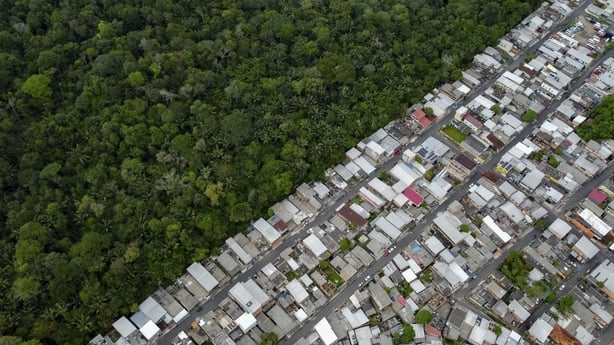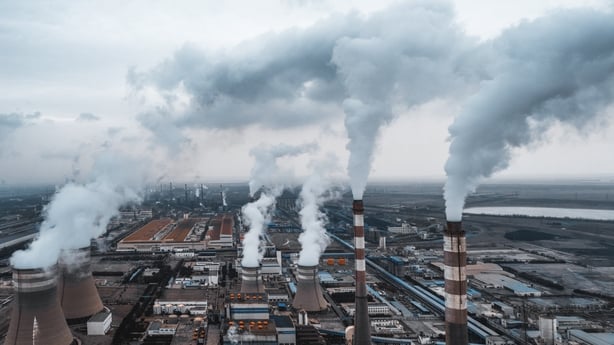The world is at a pivotal moment for humanity due to the rising threat of irreversible climatic tipping points, which could result in rapid changes to natural and ecological systems, according to a new report.
The most comprehensive assessment ever conducted of Earth's invisible tripwires was released as leaders meet for COP28 climate talks in Dubai with 2023 set to break all heat records.
These include the collapse of big ice sheets, the loss of coral reefs, and widespread thawing of permafrost with significant implications for human Society.
The Global Tipping Point Report warns that such rapid changes in the natural world pose some of the gravest threats faced by humanity. It could severely damage the planet's life-support systems and threaten the stability of societies.
The report, which was produced by an international team of more than 200 researchers, co-ordinated by the University of Exeter, is the most comprehensive assessment of tipping points ever conducted.
While many of the 26 tipping points laid out in the report - such as melting ice sheets - are linked to global warming, other human activities like destroying swathes of the Amazon rainforest could also push Earth's ecosystems to the brink.

Five of these are showing signs of tipping - from melting ice sheets threatening catastrophic sea level rise, to mass die-off of tropical coral reefs - the report warned.
Some may have already begun to irrecoverably transform.
For example, the report warns that the collapse of the Atlantic Ocean’s great overturning circulation combined with global warming could cause half of the global area for growing wheat and maize to be lost.
The full damage caused by negative tipping points, it says, would be far greater than their initial impact.
The effects will cascade through globalised social and economic systems and could exceed the ability of some countries to adapt.
The authors also warn that negative tipping points show that the threat posed by the climate and ecological crisis is far more severe than is commonly understood and is of a magnitude never before faced by humanity.
The report refers to more than 25 Earth system tipping points that have been identified from evidence of past changes, observational records, and computer models.
In the cryosphere, six Earth system tipping points are identified, including large-scale tipping points for the Greenland and Antarctic ice sheets. Localised tipping points likely exist for glaciers and permafrost thaw.

Evidence for large-scale tipping dynamics in sea ice and permafrost is limited.
In the biosphere, 16 Earth system tipping points are identified, including forest dieback in the places, savanna and dryland degradation, lake eutrophication, die-off of coral reefs, mangroves, and seagrass meadows, and fishery collapse.
In ocean and atmosphere circulations, four Earth system tipping points are identified, in the Atlantic Meridional Overturning Circulation, the North Atlantic Subpolar Gyre, the Southern Ocean Overturning Circulation and the West African monsoon.
Already, at today’s 1.2C global warming, tipping of warm-water coral reefs is likely and it cannot be ruled out that four other systems may pass tipping points: the ice sheets of Greenland and West Antarctica, the North Atlantic’s Subpolar Gyre circulation, and parts of the permafrost subject to abrupt thaw.
Passing 1.5C global warming, widespread mortality in warm-water coral reefs becomes very likely, and another three potential tipping systems start to become vulnerable: boreal forest, mangroves and seagrass meadows.
At 2C global warming and beyond, several more systems could tip, including the Amazon rainforest and subglacial basins in East Antarctica, and irreversible collapse of the Greenland and West Antarctic ice sheets is likely to become locked in.
The authors say the speed of fossil fuel phase out and growth of zero-carbon solutions will now determine the future of billions of people.

It also warns that current global governance is inadequate for the scale of the challenge and makes six key recommendations to change course fast, including coordinated action to trigger positive tipping points.
- Phase out fossil fuels and land-use emissions now, stopping them well before 2050.
- Strengthen adaptation and "loss and damage" governance, recognising inequality between and within nations.
- Include tipping points in the Global Stocktake (the world’s climate "inventory") and Nationally Determined Contributions (each country’s efforts to tackle climate change)
- Coordinate policy efforts to trigger positive tipping points.
- Convene an urgent global summit on tipping points.
- Deepen knowledge of tipping points. The research team supports calls for an IPCC Special Report on tipping points.
The report states that bold, coordinated policies could trigger positive tipping points across multiple sectors including energy, transport, and food.
A cascade of positive tipping points would save millions of lives, billions of people from hardship, trillions of dollars in climate-related damage, and begin restoring the natural world.
Additional reporting AFP








